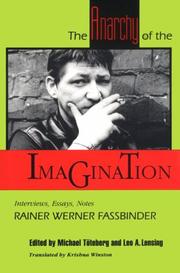| Listing 1 - 6 of 6 |
Sort by
|
Book
Year: 1946
Abstract | Keywords | Export | Availability | Bookmark
 Loading...
Loading...Choose an application
- Reference Manager
- EndNote
- RefWorks (Direct export to RefWorks)
Book
Year: 1985
Abstract | Keywords | Export | Availability | Bookmark
 Loading...
Loading...Choose an application
- Reference Manager
- EndNote
- RefWorks (Direct export to RefWorks)
Book
ISBN: 9782381980188 2381980180 Year: 2021 Publisher: Paris : L'Arche,
Abstract | Keywords | Export | Availability | Bookmark
 Loading...
Loading...Choose an application
- Reference Manager
- EndNote
- RefWorks (Direct export to RefWorks)
Pendant toute sa vie, Fassbinder a donné un grand nombre d'interviews, réfléchissant ainsi sa pratique du cinéma. Ce volume regroupe quelques entretiens et essais de sa plume, où il donne à penser le métier de réalisateur, l'engagement de l'artiste, les liens entre l'art et la politique. Si ses films constituaient un journal personnel de l'artiste, les interviews en sont le commentaire. Des propos libres et vivifiants sur le monde contemporain, les rapports entre le cinéma et la réalité, la jungle des commissions, le métier de cinéaste à Hollywood et en Allemagne, mais aussi l'amour et le travail, la violence au coeur des relations sociales et dans la sphère privée
Book
ISBN: 2847250522 9782847250527 Year: 2006 Publisher: Paris : Avant-Scène,
Abstract | Keywords | Export | Availability | Bookmark
 Loading...
Loading...Choose an application
- Reference Manager
- EndNote
- RefWorks (Direct export to RefWorks)

ISBN: 0801843685 9780801843686 0801843693 9780801843693 1555543693 9781555543693 Year: 1992 Publisher: Baltimore, Md The Johns Hopkins University Press
Abstract | Keywords | Export | Availability | Bookmark
 Loading...
Loading...Choose an application
- Reference Manager
- EndNote
- RefWorks (Direct export to RefWorks)
In Rainer Werner Fassbinder's "A Year of Thirteen Moons," the camera watches the prostitute Red Zora as she watches Fassbinder in a television interview. The actress is Ingrid Caven, the director's former wife and the woman with whom he claims to have his most important "elective affinity." At once provocative and revealing, the scene illustrates Fassbinder's interest in blurring the boundaries between art and life, between fiction and autobiography. His public comments - like his films and plays - were occasions for aesthetic experimentation rich in irony and drama. The Anarchy of the Imagination collects Fassbinder's most important interviews, essays, and working notes - nearly all presented here for the first time in English. They are an indispensable record of the self-understanding and self-stylization of this major artist, one of the most influential cultural figures to emerge from postwar Germany. Fassbinder's essays and other writings commanded a degree of public attention rarely achieved by film makers in the United States. His articles appeared in major newspapers such as the Frankfurter Rundschau and Die Zeit, where they both influenced the cultural scene and intervened in the acrimonious debates on terrorism and anti-Semitism that swept West Germany in the late 1970s and early 1980s. Whether Fassbinder is reflecting on his own work or writing about fellow film makers, whether he is describing his discovery of actress Hanna Schygulla or speaking out in favor of political film making, his perspective is radical, subjective, and challenging. The writings in this volume are not only about films, but about love, longing, dependency, repressed wishes, and dreams. They are an essential part of Fassbinder's legacy, the remarkable body of work in which present-day German reality finds brilliant expression.
Fassbinder, Rainer Werner --- Motion picture producers and directors --- Motion pictures --- film --- filmgeschiedenis --- filmtheorie --- filmregisseurs --- twintigste eeuw --- Fassbinder Rainer Wener --- Duitsland --- 791.471 FASSBINDER --- Cinema --- Feature films --- Films --- Movies --- Moving-pictures --- Audio-visual materials --- Mass media --- Performing arts --- Directors, Motion picture --- Film directors --- Film producers --- Filmmakers --- Motion picture directors --- Moviemakers --- Moving-picture producers and directors --- Producers, Motion picture --- Interviews --- History and criticism --- Fassbinder, Rainer Werner, --- Fassbinder, R. W. --- Interviews. --- Films (Motion pictures) --- Directing. --- Germany (Federal Republic) --- Persons --- Film
Book

ISBN: 9782952798334 2952798338 Year: 2010 Publisher: Paris : G3j,
Abstract | Keywords | Export | Availability | Bookmark
 Loading...
Loading...Choose an application
- Reference Manager
- EndNote
- RefWorks (Direct export to RefWorks)
Cet ouvrage rassemble 30 entretiens avec le cinéaste allemand, allant de 1969 à 1982, au cours desquels il évoque divers thèmes comme son travail, le cinéma, la politique au cinéma, les femmes, l'homosexualité, l'Allemagne...
Motion picture producers and directors --- Motion pictures --- Producteurs et réalisateurs de cinéma --- Cinéma --- Fassbinder, Rainer Werner, --- Interviews --- Production et réalisation --- Producteurs et réalisateurs de cinéma --- Cinéma --- Interviews.
| Listing 1 - 6 of 6 |
Sort by
|

 Search
Search Feedback
Feedback About UniCat
About UniCat  Help
Help News
News